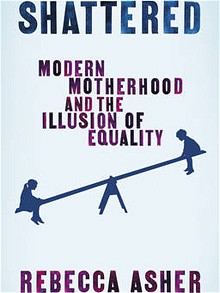
Equality as identical privilege: a parenting utopia?
On Monday I began discussing Asher’s ideas in her book ‘Shattered: Modern Motherhood and the Illusion of Equality.’ She proposed creating a world of genuinely shared parenting, in which mother and father take significant parental leave – mostly independently – then both return to flexible paid work while the state steps in with high-quality childcare to fill in the gaps.
Sounds wonderful. But does it work?
Hmmm. Key sticking points include the sheer cost of Asher’s ideas, especially when she suggests that “The most enlightened organisations might even offer all their staff the opportunity of around six months’ paid leave at an important point in their life – whether they are parents or not.” Her idealism begins to seem more admirable than practical. (Her background is in media, not business.)
Would we want to embrace her proposed model of genuinely shared parenting and working?
But if the funds were available, would we want to embrace her proposed model of genuinely shared parenting and working? Asher briefly asks whether there are any problems created by the policies she advocates, and even more briefly notes that in countries where this is the norm, children enter state childcare at the age of one and no-one stays home. It’s simply not done.
So what if either parent wanted to stay at home beyond their child’s first year? Asher ignores the issue completely and I think this is a fundamental flaw in her arguments. While the focus of this book is on shared parenting between fathers and mothers, the state is a silent third parent throughout. Do we want our pre-school aged children raised (partly) by the state rather than within a family unit? Surely this is a question that requires some consideration.
“the state promotes and facilitates the sexist notion that women should be the main carers for their children – simply because they gave birth to them.”
Asher states early on that “the state promotes and facilitates the sexist notion that women should be the main carers for their children – simply because they gave birth to them.” There’s some truth in this, but there’s much being ignored. Pregnancy forces a mother-to-be to begin to develop a relationship with her child; she cannot go for long without thinking of it, whether this is because the foetus wriggles about, or she needs the bathroom again, or she realises she no longer fits through a small space / into her favourite top, etc. A father-to-be, by contrast, can happily go all day without remembering there is a new arrival on the way.
Social changes such as those Asher suggests would go some way towards changing the balance, but the mother is still likely to be more invested in her newborn. Her hearing is adjusted to the baby’s cry while her partner might genuinely sleep on. Her nervous system responds to the baby’s; her partner’s doesn’t. Babies are designed to latch on to a primary caregiver – they aren’t programmed to split their needs equally between two parents. There are several such biological factors which mean that attempts to make men and women’s roles equal through making them identical are problematic.
attempts to make men and women’s roles equal through making them identical are problematic
Indeed, the whole concept of achieving equality through the adoption of identical roles could be viewed as problematic. Asher seeks to encourage men to embrace their responsibilities in the domestic sphere, but her insistence on the merit of paid work outside the home for supporting psychological health subtly denigrates caregiving and home-making – they are not equally valuable roles. Perhaps, instead of seeking to create a situation in which all parents are ‘working’ parents, we need to find ways to encourage society to value traditionally female roles more, whichever parent is working to fulfil them.
Final thoughts
Asher makes an excellent and timely point; motherhood does render equality a myth for many new mothers, making becoming a mother more challenging as women lose their sense of self. Recent government policies, such as extension to paternity leave and encouraging all mothers to work, seem to support her overall agenda, albeit not in the ways she would prefer. Her suggested solutions are logical but ignore some key biological and social issues which may render them less effective than she anticipates. In an environment which evidently does polarise the positions of Fathers and Mothers, this book is well worth a read.